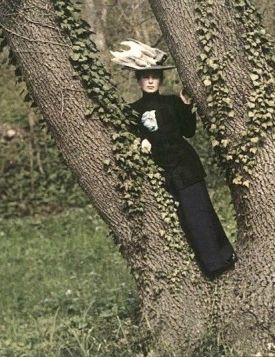Moira told me once, when I lay out across the rug-softened cabin floor with my head in her lap, about a fish living deep in the darkest part of the ocean that carries a spot of light on its forehead to lure in prey. Moira was full of stories like that—too full, I teased her sometimes, and smoothed her frown-creased forehead with kisses. She knew every danger in the seas, and feared them almost as much as I worshiped them.
It has been a long time since I saw the sea.
Forgive me if I seem sentimental. I am sure I can count my remaining hours on the fingers of one hand, and even I am sobered by such a thought.
But it is not merely this that brings Moira to my mind. I see a light now and then in the distance, across the frozen lake—the lake, I keep reminding myself, though Michigan is as wide and dangerous as the oceans from Moira’s nightmares—and I find myself drawn to it, this brief cold light, like a sea creature must feel drawn to Moira’s angler-fish.
Again, I have started wrong. Forgive me. As they said in that play Moira was so fond of, it is bitter cold, and I am sick at heart.
Sometimes I think I must be a ghost. This schooner, the Cornelius, is solid enough; but it is very late in the year, far later than I have ever sailed before, and the rest of the crew is gone. Utterly gone; not a bone nor a trunk nor a scrap of clothing left to mark their existence, and I do not remember them, neither their names nor them living nor throwing their corpses into the waves. I should think they never were, but for the fact they must have been, I could not have brought the Cornelius out here alone.
And where is here? Only the shore could tell me, and there is nothing there, nothing but limestone cliffs and snow-heavy trees and the light that comes and goes without warning. Perhaps the edge of the world is not in the ocean, as they once said, but here in the lake. Perhaps I sailed over it and reached a shadow world where it is always winter...
God, I sound like a madman. Is it the prospect of death that does this to me, or the cold, or something worse yet?
Sometimes, when the light is here, I see thin shapes moving on the ice, like men but not fully. The first time I thought my eyes were playing tricks on me. Now I’m not so certain.
Log of the Cornelius. Date Unknown (November?).—suck in ice too thin to walk on but too thick to sail through. Lighthouse (?) on the cliff sends out bean at no predictable intervals. Do they see us trapped in the ice? Then why not light the lens fully? Are they also in danger?
I think I am a ghost. I said this before, but I am growing more certain. I gestured and shouted when the last light came, but the shapes on the ice did not seem to hear me. I’m not certain I could hear myself.
The Cornelius sailed out of Milwaukee on August 16, headed for the Peninsula with a cargo of cream brick. I remember this. Why can I not remember our crew?
I do not think it is a lighthouse I see. I list in my head the lights along our route—North Point, Kevish, Port Washington, Sheboygan Breakwater—and this coast fits none of them. Nor can I imagine a lighthouse keeper sending out this weak, jolting beam on a winter night, when by all rights there should be none who even see it.
Those thin men on the ice remind me of a story, a story Moira did not tell me; it is from some of the nations here on the lakes. There is a creature, they say, in shape like a tall thin man or a corpse, that haunts the shores in search of human flesh to eat. It is called the Wendigo. I’ve never doubted these stories, and I doubt them less now. Moira, of course, would call me a fool.
Get out of here, she said, her final words to me. Get out! And I got out, got out and came to Milwaukee. Perhaps she was glad to know I was away from the sea; more likely nothing I do or did will ever make her happy again. She was made for a cleverer man than me, or else for no man at all.
As long as I am thinking of her, I will say this: I am glad she is not here, glad she is still in her cabin on the shore of the sea, where these things cannot haunt her. How gentle the sea is by comparison! We were happy there, Moira and I, despite her fears, despite the dangers. I was a happy man.
Listen to me; I am overcome with melancholy. That was one of Moira’s words. Melancholy? she’d ask, fisting her hands in my hair and pulling me in for a kiss. That will pass. But it won’t pass, Moira, never again. Never again...
The light is steady now, has been for several minutes. The thin brown figures are merely yards away from the hull. I think I was wrong, the light is not meant to lure me in, merely to guide them to me. I think they are made to walk on thin ice.
I cannot walk on thin ice. I am clumsy; I break things. Forgive me, Moira, forgive me for our dead child, forgive me for my ignorance, forgive me for leaving you.
This is foolish. I know she will never read this letter. But I am sentimental, and I must write to her nevertheless.
It has been growing gradually colder since the light became steady. This makes me hopeful that I will die of cold before the thin creatures reach me. It is not so terrible a way to die—the cold. Moria told me that, and I believe her.
There is a line, from that play she loved. It ends and flights of angels sing thee to thy rest. It is a beautiful line, and I say it now—not for me but for her. I can’t help thinking she is awake tonight and in need of rest.
The light has gone out. I hear noises on the deck—fumbling noises, dull noises, noises made by dumb things. Come and find me, thin men, Wendigo, whatever you are. Moira, forgive me. Reader, remember me.
The rest, they say, is silence.
Friday, March 01, 2013



0 comments:
Post a Comment